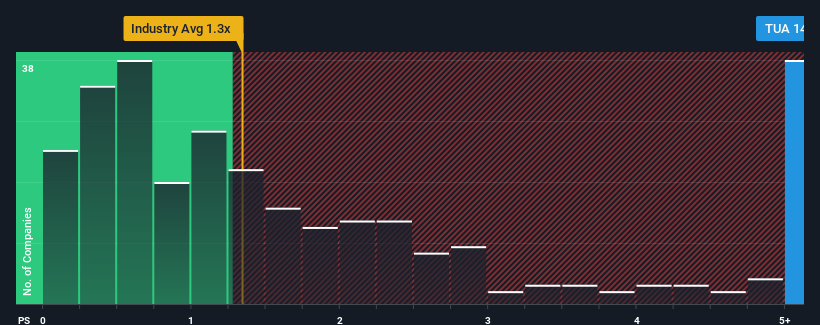Tuas Limited's (ASX:TUA) P/S Is Still On The Mark Following 33% Share Price Bounce
Tuas Limited (ASX:TUA) shares have continued their recent momentum with a 33% gain in the last month alone. The last month tops off a massive increase of 136% in the last year.
Since its price has surged higher, given around half the companies in Australia's Telecom industry have price-to-sales ratios (or "P/S") below 1.1x, you may consider Tuas as a stock to avoid entirely with its 14.2x P/S ratio. However, the P/S might be quite high for a reason and it requires further investigation to determine if it's justified.
See our latest analysis for Tuas

What Does Tuas' P/S Mean For Shareholders?
Tuas certainly has been doing a good job lately as it's been growing revenue more than most other companies. The P/S is probably high because investors think this strong revenue performance will continue. You'd really hope so, otherwise you're paying a pretty hefty price for no particular reason.
Keen to find out how analysts think Tuas' future stacks up against the industry? In that case, our free report is a great place to start.What Are Revenue Growth Metrics Telling Us About The High P/S?
In order to justify its P/S ratio, Tuas would need to produce outstanding growth that's well in excess of the industry.
If we review the last year of revenue growth, the company posted a terrific increase of 50%. This great performance means it was also able to deliver immense revenue growth over the last three years. Therefore, it's fair to say the revenue growth recently has been superb for the company.
Shifting to the future, estimates from the lone analyst covering the company suggest revenue should grow by 23% each year over the next three years. That's shaping up to be materially higher than the 3.9% per annum growth forecast for the broader industry.
With this information, we can see why Tuas is trading at such a high P/S compared to the industry. It seems most investors are expecting this strong future growth and are willing to pay more for the stock.
What Does Tuas' P/S Mean For Investors?
Tuas' P/S has grown nicely over the last month thanks to a handy boost in the share price. While the price-to-sales ratio shouldn't be the defining factor in whether you buy a stock or not, it's quite a capable barometer of revenue expectations.
Our look into Tuas shows that its P/S ratio remains high on the merit of its strong future revenues. It appears that shareholders are confident in the company's future revenues, which is propping up the P/S. Unless the analysts have really missed the mark, these strong revenue forecasts should keep the share price buoyant.
Before you settle on your opinion, we've discovered 1 warning sign for Tuas that you should be aware of.
If you're unsure about the strength of Tuas' business, why not explore our interactive list of stocks with solid business fundamentals for some other companies you may have missed.
Valuation is complex, but we're here to simplify it.
Discover if Tuas might be undervalued or overvalued with our detailed analysis, featuring fair value estimates, potential risks, dividends, insider trades, and its financial condition.
Access Free AnalysisHave feedback on this article? Concerned about the content? Get in touch with us directly. Alternatively, email editorial-team (at) simplywallst.com.
This article by Simply Wall St is general in nature. We provide commentary based on historical data and analyst forecasts only using an unbiased methodology and our articles are not intended to be financial advice. It does not constitute a recommendation to buy or sell any stock, and does not take account of your objectives, or your financial situation. We aim to bring you long-term focused analysis driven by fundamental data. Note that our analysis may not factor in the latest price-sensitive company announcements or qualitative material. Simply Wall St has no position in any stocks mentioned.
About ASX:TUA
Flawless balance sheet with acceptable track record.
Market Insights
Community Narratives



